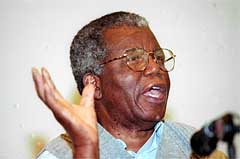"I agree, of course, about
good art changing things. But art doesn't go about promoting change in the
uncomplicated, linear equivalency of sympathetic magic, which would send its practitioner
scouring the forest for spotted leaves to cure a patient who has broken out in spots.
That is not medicine but charlatanism."
-- Chinua Achebe
American readers should keep in mind that Nigeria is
not a homogeneous culture. It is composed of hundreds of differing ethno-linguistic
groups. In particular, the Hausa peoples occupy North Nigeria, the Yoruba reside in
the Southwest, and the Igbo in the Southeast. Even the Igbo are culturally diverse;
villages only miles apart often speak different native languages.
The Igbo were well aware of both their own diversity,
as well as the differences between themselves and other groups. Despite myths to the
contrary, the Igbo were not isolated. Achebe (perhaps to stress the freedom and
communal nature of Igbo society) chose not to mention the Igbo connection to the early
African empire of Nri.
The British "pacification" of the Igbo
occurred from 1900-1920. The first wave of conquest ran from 1901-1902. The
British assumed they were dealing with a unified cultural group. They found that
each village and clan responded differently.
In some instances the British ravaged a town in order
to frighten other groups. For example, one such attack occurred at Ahiara. It
included a mistaken slaying of a white man on a bike, the village manufacture of guns, the
British confiscation of the weapons, and burning of the town. This could easily be
compared to Achebe's fictional Abame.
Igbo politics was primarily communal and collective,
emphasizing discussion. British colonial politics was more hierarchical and
emphasized obedience to orders. The two systems were bound not to understand each
other. The British decided to treat the Igbo as a single administrative unit; this
decision meant they had to create and enforce systems of tribal warrant chiefs.
British court agents, especially the local kotma,
tended to be individualists who had broken from tribal collective rule. They were
known as being quite corrupt, often prone to bribery; thus, their practice led to further
abuses in the system.
British occupation brought a great increase in trade
and local wealth, including cotton cloth, tobacco, beads, gin, porcelain plates, and iron
pots. This altered the local economic system and brought up the price of such
staples as palm oil.
[The above was gathered from Robert M. Wren,
"Things Fall Apart in Its Time and Place" and Dan Izevbaye, "The
Igbo as Exceptional Colonial Subjects."] |
